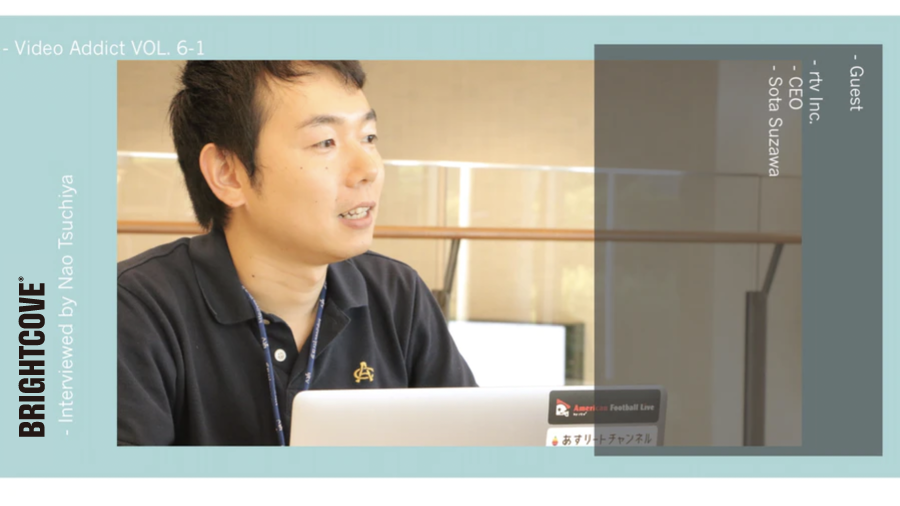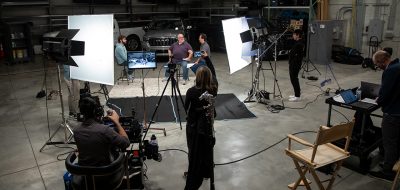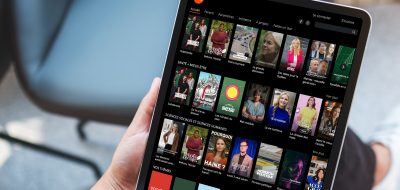In Video Addict Vol.6, we will be interviewing rtv, a company that operates the American football video media “American Football Live by rtv” and also distributes small-scale local sports, mainly in the Kansai region. Since rtv began official live streaming of the league in collaboration with the Kansai Student American Football Federation in 2012, it has been involved in the business of live streaming not only American football but also various local sports. Why are they involved in video distribution for sports that the major media have not covered until now? We asked the company’s representative director, Mr. Suzawa.
Sota Suzawa
rtv Inc.
Representative Director
Born in Nagano Prefecture in 1989. Graduated from the College of Image Arts at Ritsumeikan University. After working in sales for a broadcasting equipment manufacturer and a venture company in the education and management consulting fields, he launched rtv Inc. With the concept of “things that can’t be broadcast on TV or done by major media companies”, he is currently involved in the operation of “American Football Live by rtv”, a vertical media service developed in collaboration with American football organizations, as well as planning, production and SNS marketing for live broadcasts that pursue cost performance in collaboration with sports organizations, TV stations and sports equipment manufacturers, and is involved in projects that support the development of local sports and regional culture.
## I’ve loved ‘making things’ since I was a child
**Brightcove (BC) Tsuchiya**: First of all, could you tell us a little about your background?
**rtv Mr. Suzawa**: I’ve loved ‘making things’ since I was a child, and I’ve always enjoyed tinkering with machines and doing electronic work. From junior high school, I didn’t really like going to school, and there was a period when I didn’t like going to high school either.
At that time, the teacher who was the advisor for the broadcasting club asked me if I would like to join the club, saying “High school might not be fun, but if you’re interested in equipment and making things, why not join the broadcasting club? The club was famous in the prefecture, winning awards at NHK high school competitions and so on, so I was interested and joined. That was how I got involved in broadcasting, program production and video.
When you hear the word “broadcasting club”, you might imagine something like an in-school announcement, but the program production was quite professional, with things like producing documentary programs from a high school student’s perspective and entering them into contests. We went to various places to do interviews, and edited videos that we had filmed until late at night or early in the morning, so it was hard work for high school students, but I enjoyed the work of bringing to the surface the appeal of the local area, and I was happy to see that the people we were interviewing were genuinely pleased with our work, so I continued.
**BC Tsuchiya** I’m surprised that you were involved in broadcasting from high school, and that you were noticed locally.
**rtv Suzawa** I found it interesting that I could use video to express things that were happening locally, or things that the mainstream media wouldn’t cover, in my own way.
At Ritsumeikan University, where I went on to study, I majored in film at the School of Image Arts and Sciences, and also joined the broadcasting club. When I was in my fourth year, services like Nico Nico Douga and Ustream started to become popular. The university curriculum and classes didn’t have much to do with video business or distribution, but I thought that by using these services, we could also distribute local sports and events on campus that the mainstream media wouldn’t cover, so I started to teach myself how to distribute video. At the time, we didn’t have much money, so we bought second-hand cameras and other equipment on auction sites, and we did a lot of trial and error as students, like using a consumer-use HDD deck to play back and slow down the footage. We had limited equipment and a limited budget, but we wanted to pursue what we could do within those limits and deliver video content that was really focused on the content of the footage.
## We had 20,000 simultaneous viewers, and we got a taste for it (lol)
**rtv Mr. Suzawa** Around that time, I learned that the Ritsumeikan University American football team had made it to the playoffs in the league, but that there would be no TV broadcast. So, we received a request from the team to do a live broadcast, and we did our first live broadcast on Ustream, and we had 20,000 simultaneous viewers, and we got a taste of it (lol)
**BC Mr. Tsuchiya** Although it was a different time period, even compared to now, 20,000 simultaneous viewers is amazing.
**rtv Mr. Suzawa** Rather than the number of viewers, I felt the potential of live streaming in that it allowed us to bring content that would not have been seen otherwise to the world in this way.
**BC Mr. Tsuchiya** Your original experience of making local documentaries in high school was replaced by live streaming of American football using the most advanced video streaming technology of the time, and led to the founding of rtv, didn’t it?
**rtv Mr. Suzawa** That’s how it turned out, but after graduating from university, I worked for a company called Masspro Denko before starting my own business. I thought it would be a bad idea to start a business without any experience of working in the real world, so I made that decision, but after six months I was recruited by another company and left immediately. I worked at the second company, a management consulting venture, for three years, but from the time I joined I was also setting up the predecessor to rtv, “Reconnect Television”.
**BC Tsuchiya** Was there any problem with the company you were working for at the time?
**rtv Mr. Suzawa** The president of the second company I worked for was involved in supporting entrepreneurs, so he understood our activities, and he said that as long as our normal work (Monday to Friday) was not affected, there would be no problem. For that reason, the activities of the general incorporated association Reconnect Television were limited to Saturdays and Sundays when it was first established. However, the activities of Reconnect Television gradually became more important, and eventually we shifted to focusing solely on Reconnect Television activities. In 2018, we transitioned to “rtv Inc.”, but we are currently in our eighth term as the general incorporated association Reconnect Television.
## We want to aim to create a business that creates value from zero to one through live streaming
**BC Tsuchiya** rtv seems to be a company that is skilled in live streaming technology and knowledge on the internet, rather than video production. What kind of company are you aiming to be?
**rtv Mr. Suzawa** We often receive requests to produce videos and provide live streaming services, and of course we also provide non-sports-related streaming technology services, but our ultimate goal as a company is not simply to provide technology. We are interested in technology, and as our technological capabilities improve, the range of things we can do also expands, but as a company, our aim is to increase the value of local sports and communities, and to increase the number of new fans.
First of all, we want to work with sports organizations, teams and the media to think about ways to increase the number of fans through on-demand and live streaming, and through social networking services. By increasing the number of casual fans and core fans, we think the value will increase, and we think that monetization strategies will naturally emerge.
**BC Tsuchiya** I see. So, by providing video streaming that has not been done before, you are aiming to increase the number of fans and attention for local sports, and to use this to revitalize the local community.
**rtv Mr. Suzawa** That’s right. Rather than trying to turn 10 into 1000 like the major media, we want to specialize in projects that turn 0 into 1. As a business, our main focus is on sports media promotion. Our mission is to use internet media to promote local sports and create fans.
That concludes Part 1. This was an interview where you could really feel Mr. Suzawa’s passion for local sports and regional development. In Part 2 (https://www.brightcove.com/ja/resources/blog/video-addict-vol6-rtv-2/), he talks about the business of rtv.




